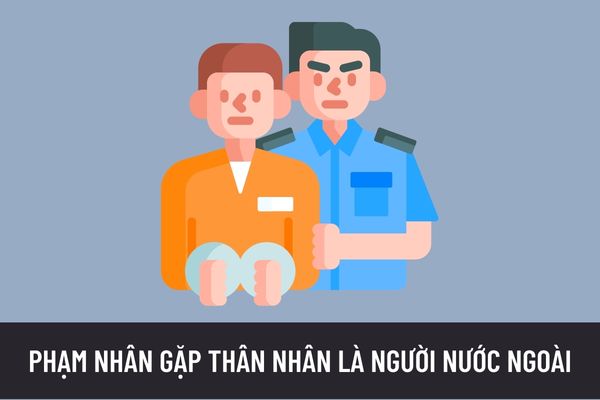Are Prisoners Allowed to Meet Foreign Relatives? What Procedures are Required?
Are inmates allowed to meet with relatives who are foreigners?
According to Article 4 of Circular 182/2019/TT-BQP which regulates the individuals who are allowed to visit inmates serving sentences, as follows:
Individuals allowed to visit inmates
1. Individuals allowed to visit inmates include: paternal grandparents; maternal grandparents; biological parents; parents-in-law; lawful adoptive parents; spouse; biological children, daughters-in-law, sons-in-law, lawful adopted children; biological siblings; siblings-in-law; siblings of the spouse; uncles, aunts, uncles-in-law; nephews and nieces. The number of relatives visiting the inmate at one time shall not exceed 03 people.
2. Representatives of agencies, organizations, or other individuals not mentioned in Clause 1 of this Article may visit inmates if the head of the detention facility considers it suitable for crime prevention work and the management and education of inmates.
Thus, according to the above regulations, there is no restriction on visiting inmates serving sentences if the relatives are foreigners.
Relatives of those serving sentences only need to belong to the legally allowed categories to visit the inmate, which includes paternal grandparents; maternal grandparents; biological parents; parents-in-law; lawful adoptive parents; spouse; biological children, daughters-in-law, sons-in-law, lawful adopted children; biological siblings; siblings-in-law; siblings of the spouse; uncles, aunts, uncles-in-law; nephews and nieces.

Are inmates allowed to meet with relatives who are foreigners? If so, what procedures are required?
What are the procedures to meet with relatives who are foreigners?
According to Article 5 of Circular 182/2019/TT-BQP which regulates the procedures for visiting inmates, as follows:
Procedures for visiting inmates
...
4. When visiting, besides an application (for individuals), an official letter (for agencies, organizations), visitors must bring one of the following documents: Identity Card or Citizen ID card; passport; documents proving that they are officers, soldiers, or employees if belonging to the armed forces. In case the visitor does not have personal identification documents, they must have an application with a photo attached certified by the commune-level People's Committee or commune-level Police where they reside or the organization where they work or study, stamped across the photo.
...
6. Procedures for visiting an inmate who is a foreigner shall be implemented according to Clause 5, Article 52 of the Law on Execution of Criminal Judgments.
Referencing Article 52 of the 2019 Law on Execution of Criminal Judgments which regulates cases where relatives are foreigners, as follows:
Regime of meeting and receiving gifts for inmates
...
5. Relatives of inmates coming to visit must bring a visit book or an application for a visit certified by the commune-level People's Committee or commune-level Police where they reside or of the agency, organization where they work or study. Prisons, detention centers, and the criminal judgment execution agency of district-level police shall inform the inmate's relatives about the regulations on visiting inmates; inmate's relatives must comply with these regulations.
In the case where the inmate is a foreigner, and their relative is a foreigner, an application for a visit must be sent to the criminal judgment execution management agency. The application must be written in Vietnamese or translated into Vietnamese and certified by the diplomatic or consular representative office of the country whose nationality the person holds, or the representative office of the international organization in Vietnam where the person works. If the inmate's relative is Vietnamese, the application must be certified by the commune-level People's Committee where they reside. Within 15 days from the date of receiving the application, the criminal judgment execution management agency is responsible for replying to the applicant; in special cases, the response time may be extended but not exceeding 30 days.
...
Thus, for cases where the inmate has relatives who are foreigners, an application for a visit must be sent to the criminal judgment execution management agency. The application must be written in Vietnamese or translated into Vietnamese and certified by the diplomatic or consular representative office of the country of the application's nationality, or the representative office of the international organization in Vietnam where the person works.
In addition to the application for visiting an inmate, foreigners must also bring their personal identification documents (passport) to present to the officials at the detention facility when requested.
Is it mandatory for relatives to use Vietnamese when visiting an inmate?
According to Article 6 of Circular 182/2019/TT-BQP which regulates the responsibilities of relatives and inmates during visits, as follows:
Responsibilities of relatives and inmates during visits
...
3. When communicating, the visitor and the inmate must use the Vietnamese language; in cases of ethnic minorities or foreigners who do not know Vietnamese, they may use another language. Individuals with hearing or speech impairments may use sign language or supportive devices for communication, but these must be checked by responsible officials before use.
...
According to the regulations, when communicating, the visitor and the inmate must use the Vietnamese language; in cases of foreigners who do not know Vietnamese, they may use another language.
LawNet
